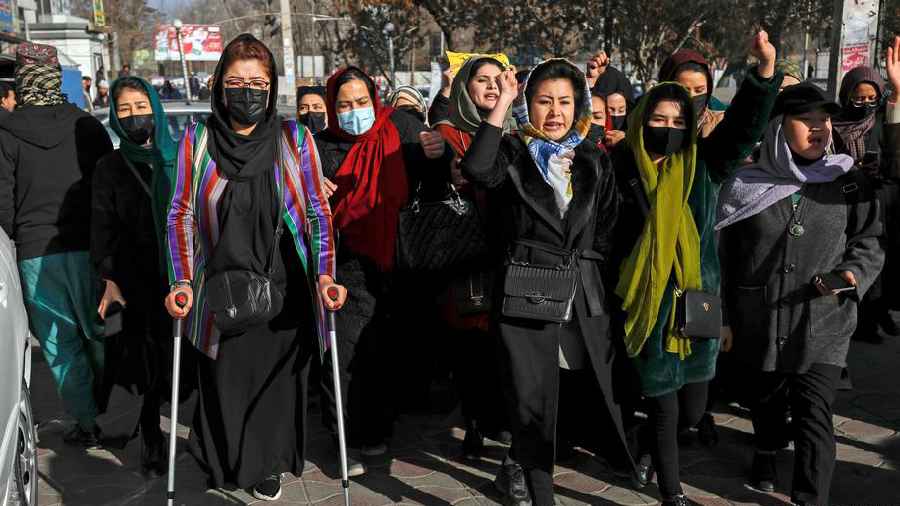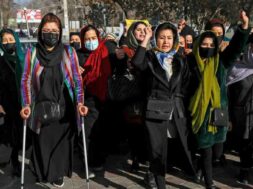
3 Foreign NGOs Suspend Operations in Afghanistan after Ban on Women Workers
Manas Dasgupta
NEW DELHI, Dec 25: At least three international aid groups on Sunday announced suspension of their operations in Afghanistan in the wake of an edict by the Afghan Taliban rulers banning women from working in foreign and local Non-Governmental Organisations.
Save the Children, the Norwegian Refugee Council and CARE, said they cannot effectively reach children, women and men in desperate need in Afghanistan without the women on their workforces. The NGO ban was introduced on Saturday allegedly because women weren’t wearing the Islamic headscarf correctly.
“We have complied with all cultural norms and we simply can’t work without our dedicated female staff, who are essential for us to access women who are in desperate need of assistance,” Neil Turner, the Norwegian Refugee Council’s chief for Afghanistan, said. He said the group has 468 female staff in the country.
The developments came in response to the Taliban’s latest edict that curtails the rights and freedoms of women since they seized power last year and follows sweeping restrictions on education, employment, clothing and travel. The Taliban government had on Saturday ordered all foreign and domestic non-governmental groups in Afghanistan to suspend employing women.
The order came in a letter from Economy Minister Qari Din Mohammed Hanif, which said any NGO found not complying with the order would have their operating license revoked in Afghanistan. The letter’s content was confirmed by the ministry’s spokesman, Abdul Rahman Habib.
The ministry said it had received “serious complaints” about female staff working for NGOs not wearing the “correct” headscarf, or hijab. It was not immediately clear if the order applies to all women or only Afghan women working at the NGOs.
The U.S. has condemned the Taliban for ordering non-governmental groups in Afghanistan to stop employing women, saying the ban would disrupt vital and life-saving assistance to millions. The Taliban takeover last year sent Afghanistan’s economy into a tailspin and transformed the country, driving millions into poverty and hunger. Foreign aid stopped almost overnight.
Sanctions on Taliban rulers, a halt on bank transfers and frozen billions in Afghanistan’s currency reserves have already restricted access to global institutions and the outside money that supported the country’s aid-dependent economy before the withdrawal of U.S. and NATO forces. “Women are central to humanitarian operations around the world,” US Secretary of State Antony Blinken said Saturday. “This decision could be devastating for the Afghan people.”
More details were not immediately available on the latest Taliban ban amid concerns that it could be a stepping-stone to more restrictive measures against women in Afghanistan. Also Saturday, Taliban security forces used a water cannon to disperse women protesting the ban on university education for women in the western city of Herat, eyewitnesses said. The Taliban rulers on Tuesday banned female students from attending universities effective immediately.
Afghan women have since demonstrated in major cities against the ban, a rare sign of domestic protest since the Taliban seized power last year. The decision has also caused outrage and opposition in Afghanistan and beyond. According to eyewitnesses in Herat, about two dozen women were heading to the provincial governor’s house Saturday to protest the ban, chanting: “Education is our right,” when they were pushed back by security forces firing the water cannon.
Video showed the women screaming and hiding in a side street to escape the water cannon. They then resume their protest, with chants of “Disgraceful!” One of the protest organisers said between 100 and 150 women took part in the protest, moving in small groups from different parts of the city toward a central meeting point.
“There was security on every street, every square, armoured vehicles and armed men,” she said. “When we started our protest, in Tariqi Park, the Taliban took branches from the trees and beat us. But we continued our protest. They increased their security presence. Around 11 a.m. they brought out the water cannon.”
A spokesman for the provincial governor, Hamidullah Mutawakil, claimed there were only four-five protesters. “They had no agenda, they just came here to make a film,” he said, without mentioning the violence against the women or the use of the water cannon.
There has been widespread international condemnation of the university ban, including from Muslim-majority countries such as Saudi Arabia, Turkey, the United Arab Emirates and Qatar, as well as warnings from the United States and the G-7 group of major industrial nations that the policy will have consequences for the Taliban.
An official in the Taliban government, Minister of Higher Education Nida Mohammad Nadim, spoke about the ban for the first time on Thursday in an interview with the Afghan state television. He said the ban was necessary to prevent the mixing of genders in universities and because he believes some subjects being taught violated the principles of Islam. He also added the ban would be in place until further notice.
Despite initially promising a more moderate rule respecting rights for women and minorities, the Taliban have widely implemented their interpretation of Islamic law, or Sharia, since they seized power in August 2021. They have banned girls from middle school and high school — and now universities — and also barred women from most fields of employment. Women have also been ordered to wear head-to-toe clothing in public and have been banned from parks and gyms.














